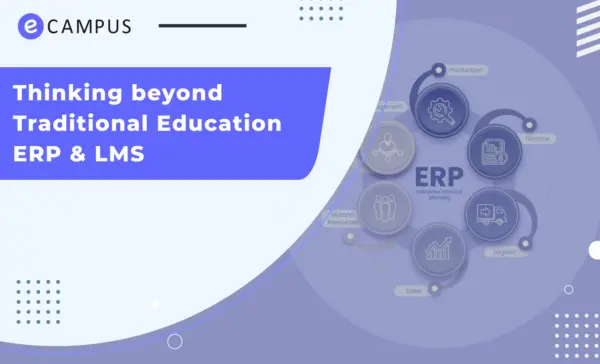Thinking beyond Traditional Education ERP & LMS
Why shouldn’t our educational system follow the same path if the entire globe is upgrading? The contemporary Learning Management System (LMS) and Enterprise resource planning (ERP) eliminate the limitations imposed by traditional brick-and-mortar educational institutions.
Bloated on-premise enterprise resource planning (ERP) technologies have typically been utilised to give fully integrated capabilities to manage business operations, in contrast to the Learning Management System ( LMS) conventional concentration on course administration, learner enrolment, and classroom management. Despite having the resources at their disposal, many organisations continue to waste time on repetitive and menial operations.
This objective hasn’t been met by the traditional educational system, though. The foundation of a traditional educational system is a teacher, pupils, and parents. The traditional educational system, however, has not allowed any of them to function in their respective capacities. Numerous factors contribute to this.
A traditional classroom-based strategy loses effectiveness as modern technology advances, digital resources is used more frequently, and learners’ demands change. Schools and universities use LMS as a solution to the problem. Even though e-learning won’t completely replace traditional classroom instruction, there are times when having a classroom setting is necessary to help kids socialise because having a physical presence is essential. Additionally, school administrators frequently cannot afford the cost, time, or effort required to implement a full ERP. It’s a simple fact that many businesses don’t need this much coercion to expand and improve. It is now necessary to think more broadly than the typical ERP and also to cross uncharted digital waters to overcome obstacles and seize new opportunities.
How is eCampus a perfect amalgam of ERP and LMS?
he transformation of all classes into “visually enabled classes” occurs when a school becomes eCampus-enabled. It is also much more than just an ERP platform. Unlike an ERP, which is limited to managing administrative tasks, eCampus provides schools with student data to aid in appropriate remediation. Additionally, the post-pandemic world won’t be the same, at least in terms of how schools operate.
By providing teachers with the tools they need to become exceptional teachers and engage their students deeply, eCampus makes the process of teaching even easier for them.
Technology in education is a step in the right direction for improved administration and learning. The management of educational institutions is made easier thanks to LMS portals and ERP because the identical task will now be completed with a single button click. They are more effective while reducing human workload.
Here are some reasons why thinking beyond the traditional education will prove effective :
-
- Learning landscape has changed with adopting a Digital mindset :
The LMS is primarily utilised as an organisational and administrative tool, supplementing the learning environment in the classroom. Students can access an LMS to view grades, download assignments, and post coursework. A lot of learning now takes place online due to the evolution of the educational landscape therefore, platforms must work to keep students interested outside of the traditional classroom setting. Nearly every industry and region in the world is discussing digital transformation projects in great detail. The use of data-driven decisions to advance education is no longer an idea; it is now the norm.
-
- Learners demand personalization :
Learners today are accustomed to tailored content in how they consume information, shop, read the news, and keep up with friends and family through mobile and digital media. Because of this, students want to learn at their own pace and with the content that is best suited to meet their own needs. Similarly, the modern learning system is excellent for students who learn swiftly because it allows you to advance through your course without losing time waiting for others to catch up. However, traditional classroom-based education makes it hard to achieve this.
-
- Engagement is more important than participation :
Although an LMS focuses on controlling learning, engagement is getting neglected. The leading eLearning programs available today use a range of features to keep students interested and motivated to learn more and for longer. Key engagement factors to think about:
1. The use of games
2. Content in bits
3. Video
In conclusion, physical classrooms will still exist, but online courses will overtake them as the main form of instruction in the future. Similar to traditional education, a hierarchy of e-learning institutions will develop based on such factors as perceived quality and student employability.



Leave a Reply